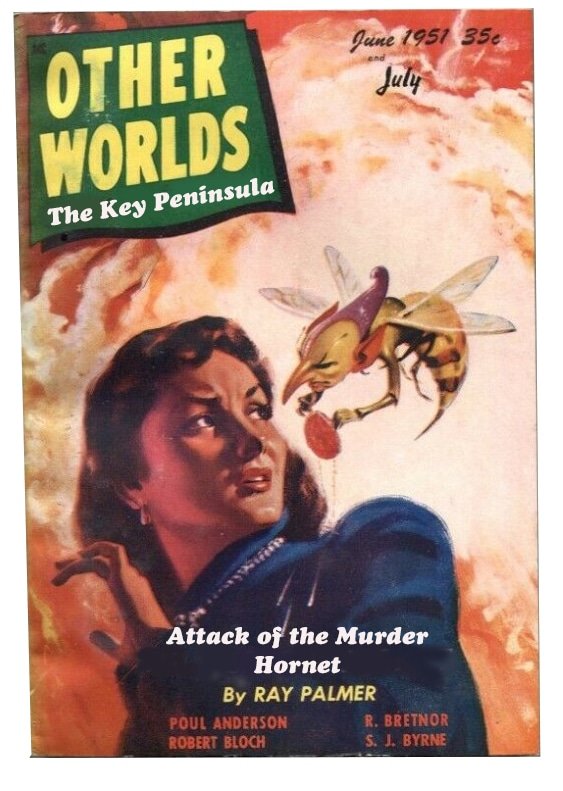A winged giant has found its way to Washington and it brought an appetite.
The Asian giant hornet, or Vespa mandarinia by its Latin name, is the world’s largest hornet, growing up to 2 inches long. With orange and black stripes, it might closely resemble a yellow jacket — if not for the notable size difference.
There were two confirmed sightings of the Asian giant hornet near Blaine, Washington, and in Nanaimo, British Columbia.
Washington State University Island County Extensions Director Tim Lawrence said the Asian giant hornet can carry seven times the amount of venom as a honey bee and its long powerful stinger can pierce most beekeeping suits. Worse still, they nest underground, making hives difficult to spot until it’s too late.
“Their stings are reportedly much more painful than other hornets. Many stings can sometimes be lethal,” Lawrence said. “But they’re not particularly aggressive. The real threat is to the honey bees.”
Asian giant hornet queens emerge from hibernation in April and begin consuming a carb-heavy diet of plant sap and fruit. Once they’ve found a nest and established a colony, the queen will send out workers to find food and prey.
“By the time you see hornets attacking a honey bee hive, it’s too late to intervene.”
By late summer and early fall, hornets focus on hunting for protein to feed the next year’s queens. Once they’ve located a honey bee hive, these ravenous predators kill adult bees and devour larvae and pupae until there’s nothing left.
David Leger, president of Key Peninsula Beekeepers, explained that a group of Asian giant hornets can wipe out an entire honey bee hive in just a few hours.
“By the time you see hornets attacking a honey bee hive, it’s too late to intervene,” he said. “It’s best to report the sighting and let nature run its course.”
While this giant doesn’t typically sting unless its nest or food is threatened, they will defend a honey bee hive under siege.
The Asian giant hornet’s natural home is in the forests and low mountains of east Asia. Lawrence said the similarities between the hornets’ native environment and our own may allow them to thrive here as well.  Courtesy Dan Clouse.
Courtesy Dan Clouse.
In Asia, native honey bees have evolved alongside the Asian giant hornet, allowing them to learn how to defend against the predator. The Japanese honey bee can detect the pheromones the hornets use to mark their nest for attack and will create highly coordinated attacks on invading hornets. The European honey bees that call the Pacific Northwest home have no such defenses.
“Honey bees are major pollinators. They support a lot of our agriculture,” Leger said. “So, a decline in honey bees is going to have negative impacts on our agriculture.”
If Asian giant hornets become established in North America, it could mean more than a nasty sting and annihilated bee hives. Their impact could have far-reaching effects.
“This is our window to keep it from establishing,” Chris Looney, an entomologist with the Washington State Department of Agriculture, said in an interview with The New York Times. Looney said if the hornets can’t be eradicated in the next few years, they will likely be here to stay.
There are still obstacles facing efforts in containing the invasion. Lawrence said there’s still a lot that researchers don’t know about the Asian giant hornet. It’s unclear if the hornets will have any natural predators here, what their territorial range is, how far their queens will travel to find a new nest, or what other insects they will feed on.
The first hurdle is figuring out how widespread the hornets really are, Lawrence said.
Experts are encouraging residents to report sightings of the hornet to WSDA’s website. But since the recent article in The New York Times, they have become inundated with reported sightings and not just from Washington. Many of these sightings have been identified as native sawflies, which are sometimes nearly as large as Asian giant hornets.
Leger said educating people on the difference in appearance of hornets will help reduce the misidentified sightings. Ordinarily at this time of year, the KP Beekeepers begin meeting again. Unfortunately, Leger said, that’s not possible during the coronavirus outbreak.
To learn more about the Asian giant hornet or report a sighting, visit WSDA’s website at agr.wa.gov/hornets.
UNDERWRITTEN BY THE FUND FOR NONPROFIT NEWS (NEWSMATCH) AT THE MIAMI FOUNDATION, THE ANGEL GUILD, ADVERTISERS, DONORS AND PEOPLE WHO SUPPORT INDEPENDENT, NONPROFIT LOCAL NEWS